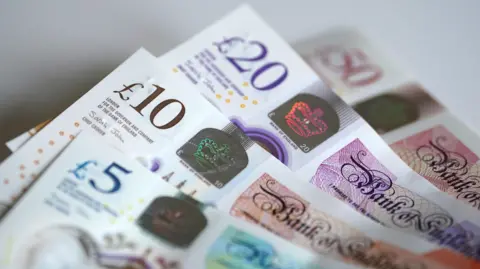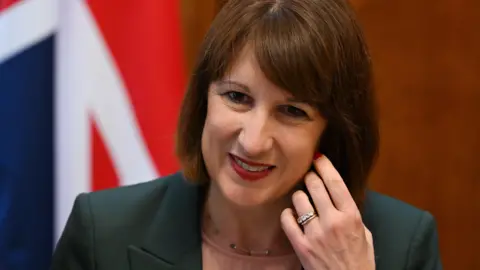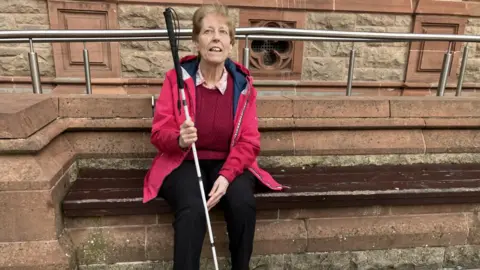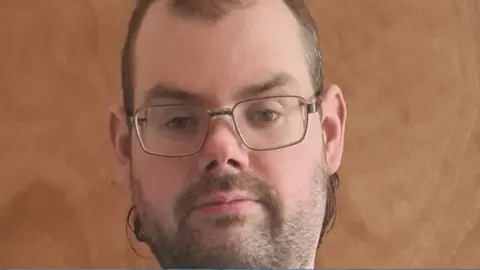Defence spending boost is macho agenda, first minister says
 PA Media
PA MediaAn increase in UK defence spending is part of a "macho agenda of militarisation", Northern Ireland's first minister has said.
Michelle O'Neill was speaking after the chancellor used her Spring Statement to confirm an additional £2.2bn for the Ministry of Defence in the next financial year.
Rachel Reeves said the additional spending was needed to "secure Britain's future in a world that is changing before our eyes".
Reeves also announced further benefits cuts as she attempts to meet self-imposed borrowing rules.
Existing claimants of the health element of Universal Credit will see their entitlement frozen at £97 a week until 2029-30.
It followed an earlier decision that new claimants would have their entitlement halved and then frozen.
The government's own assessment suggested the cumulative impact of the benefit change could lead to 250,000 more people in poverty in the UK by 2030, including 50,000 children.
The vast majority (96%) of families that lose financially are estimated to have someone with a disability in the household.
Reeves said that public spending will also grow by less than planned, with an average of 1.2% growth after 2026.
That followed a downgrade in UK growth prospects from the independent Office for Budget Responsibility (OBR).
It said growth this year would be just 1% compared to a 2% estimate made in the autumn.
 PA Media
PA MediaThe first minister called the statement a "macho agenda" at a time when the public sector is "on its knees" and the health service is in need of investment.
"This is a time for our own administration to fight back hard against this militarisation agenda," she added.
"This does not serve the interests of the people here."
Deputy First Minister Emma Little-Pengelly said the chancellor needed to change course and argued that Reeves was "punishing" people who were least able to "take the burden".
Little-Pengelly said defence spending was a "necessity" but that she believed the chancellor had a range of political choices and her decisions were "a consequence of a lack of economic growth".
What does defence spending mean for NI?
Additional spending on defence will not mean more money for Stormont.
Increases to the "block grant" it receives from the Treasury are made using the Barnett formula.
It gives Northern Ireland a population-based share of increased spending in England, adjusted for the extent to which services are devolved.
As no defence powers are devolved, the Barnett formula does not deliver any additional funding.
Northern Ireland could still benefit from defence spending if more money is spent on defence contractors in Northern Ireland.
For example, earlier this month, Thales, a French arms manufacturer, said it would open a new facility in NI and recruit 200 staff.
Claimants' reaction

A rally organised by Disabled People Against Cuts (DPAC) in Londonderry on Wednesday coincided with a UK-wide "day of action" in opposition to the government's welfare reforms.
Tony O'Reilly, a wheelchair user from the city, claims Personal Independence Payment (PIP), which is a benefit for people with a long-term physical or mental health condition, or disability.
There will be a stricter eligibility test for PIP, the main disability benefit, from November 2026.
"PIP makes things much easier," he said.
"I use my mobility car to get out, to go to the cinema, to speak to people.
"People use PIP to help with essential costs. It's crazy, cruel and inhumane [to change it]."

Martha McClelland, who is blind and has bipolar affective disorder, said she used her benefits to take taxis to the gym and to the school where she teaches.
She also receives PIP.
"It is very difficult as it is and I think those people who think you just walk in and get it, it's not true," she said.
 Bryan Sutherland
Bryan SutherlandBryan Sutherland, 37, who is autistic along with several other disabilities, said his benefits help him with the transport costs of visiting his mother and a theatre group he is involved in.
He said things are already tough for people on benefits and it looks like they are going to get worse.
"Really, in the last week, I've actually been starving, would you believe," he said.
"I've had no real food for about a week.
"I'm trying to save money up in case they take money off me. What I was able to buy two weeks ago, I'm not buying."
